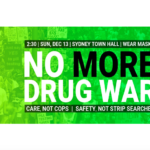Future Generations Will Condemn the Drug War: Reform Is Urgent and Inevitable

Virtually all cultures in history have used psychoactive drugs. One of the few objects nomadic Indigenous Australians carried from one camp to the next was so-called “bush tobacco” or “pituri”, containing the psychoactive ingredient nicotine which reduces heat loss when sleeping semi-naked in the desert.
Australia’s first drug laws banned the smoking of opium in the mid-19th Century. The only people who smoked opium in Australia at the time were Chinese.
These racist laws were clearly directed against Chinese people who had been attracted to Australia by the search for gold. Similar laws were passed at the same time and for the same reason in California, the US and British Columbia, and Canada.
Racism had a lot to do with the development of global drug prohibition in the 20th Century.
Drug use can have benefits but also can cause considerable harm. Sometimes policy intended to reduce harm causes even more harm than the drugs themselves. As the late Kofi Annan, former UN Secretary General, said “We believe that the global war on drugs is now causing more harm than drug abuse itself.” Separating drug-related and policy-related harms is often very difficult.
More than a century ago, the international community began an experiment of dividing psychoactive drugs into a small legal group and a much larger illegal group. There was no pharmacological, scientific, public health or public policy reason for this division.
Why drugs were divided like this is still a mystery.
But once the decision was made, the system took on a life of its own with widely adopted international treaties and a network of international organisations established to develop, implement and monitor drug control policy.
It is now increasingly clear that this experiment has failed abjectly. Helen Clark, the former New Zealand prime minister, and administrator of the United Nations Development Programme recently noted:
“There is a clear and growing consensus: around the world, the so-called ‘war on drugs’ is failing.
Some $100 billion a year is spent fighting the war, yet drug use increases every year.
Illegal drug markets have expanded relentlessly to meet this growing demand, with opium and coca production rising respectively by 130 percent and 34 percent between 2009 and 2018.
The number of drug-related deaths continues to reach new peaks, with 450,000 drug use-related deaths in 2015 alone. Much of this rise is driven by the North American opioid overdose crisis, with total overdose deaths in the United States reaching a record 72,000 people in 2017. This is more than the total number of US soldiers who died in the Vietnam War.
Punitive drug law enforcement is fuelling mass incarceration and prison overcrowding, with one in five of the world’s 10 million prisoners now incarcerated for drug offences, mostly for minor, nonviolent drug possession. This proportion is even greater for women, reaching over 50 percent in several Latin American countries and over 80 percent in Thailand.
Furthermore, drug market-related violence has spiralled to unprecedented levels. In Mexico alone, there have been up to 250,000 killings and 32,000 disappearances since 2006. This horrific level of bloodshed is compounded by illegal state actions where, at its extremes, the war on drugs is providing political cover for some of the most egregious human rights abuses taking place anywhere on the planet.
Thousands have been executed for drug offences over the past decade and, according to several human rights groups, up to 12,000 people have been killed extra-judicially in horrific drug war operations in the Philippines since 2016.
Rather than eradicating drugs, prohibition is empowering and enriching organised crime groups.”
The problems caused by the failed policy of drug prohibition are even more severe in drug producing and trafficking, low and middle income countries than they are in the rich world.
Over the last half century, the $400 billion global illicit drug market has expanded greatly and become much more dangerous. The street price of illicit drugs has dropped substantially and continues to fall.
Deaths, disease, crime, corruption and violence related to illicit drugs have increased substantially. In Australia, there were six heroin overdose deaths in 1964. In the next 33 years, the rate of heroin overdose deaths increased 55 times.
The time has come when the abject failure of global drug prohibition can no longer be denied. It is time to think about the realistic options available: options that must be politically acceptable but also have to be economically realistic. As Gramsci has said “the old is dead but the new is not yet born”.
In my opinion, the threshold step required is to redefine currently illicit drugs as primarily a health and social issue. There always will be a place for law enforcement but it should be a subsidiary role. Second, drug treatment must be expanded and improved until it reaches the same high standards as the rest of the healthcare system.
Third, penalties against the possession of personal quantities of currently illicit drugs should be scrapped. Fourth, notwithstanding the political and logistical obstacles to achieving this, as much of the drug market as possible must be regulated. Fifth, opportunities for our young people must be improved so that they can look forward to their future with optimism.
Identifying benefits from punishing people for the use or possession of personal quantities of currently illicit drugs is challenging. However, the unintended negative consequences for ‘offenders’ are often severe and may include damage to relationships, employment and accommodation.
Usually drug use after the punishment continues unchanged. Punishing people for the possession of small quantities of currently illicit drugs consumes significant resources. It is also unfair for people with majority drug preferences to punish people with minority drug preferences, absent harm to others.
Many will regard this package of reforms as unachievable. I accept that in prospect this package may seem impossible, but I suggest that in retrospect many will see these reforms were inevitable.
We have been through similar experiences many times before including the fall of the seemingly impregnable system of apartheid in South Africa or the fall of communism in the USSR and its satellites.
As Francis Hodgson Burnett said in A Secret Garden: “At first people refuse to believe that a strange new thing can be done, then they begin to hope it can be done, then they see it can be done… then it is done and all the world wonders why it was not done centuries ago.”
The measures I have just listed all regulate parts of the drug market. More importantly, they reduce harm substantially. We know what needs to be done to reduce problems due to currently illicit drugs and drug policy. But we are prevented from moving ahead by fear, especially the fear of unknown political consequences.
The health, social and economic cost of the legal drugs, tobacco and alcohol, dwarf the problems caused by illicit drugs yet are virtually ignored. Smoking causes more deaths than all other drugs combined. Up to two of every three long-term smokers will die from a smoking-related cause.
There were 100 million deaths from smoking in the world in the last 100 years with another one billion deaths from smoking likely in the next 100 years. The development of an efficient vaping device 15 years ago now allows the world to dramatically reduce deaths and disease from smoking.
Likewise, snus, a moist oral form of tobacco popular among Swedish men for decades, allows people to continue enjoying nicotine without the toxic effects of tobacco combustion.
Again, with tobacco, we know what needs to be done to reduce harm from smoking and oral smokeless tobacco, but we do not yet know how to ensure the adoption of effective policies to reduce harm. Harm reduction always faces fierce opposition.
It’s much the same story with alcohol, the cause of much serious health, social and economic harm around the world.
Effective ways of reducing alcohol-related harm have been known for decades. But an all-powerful drinks industry prevents governments adopting effective reforms such as modestly increasing price or restricting availability.
What is the role of the Church in these debates? In my view, the Church has a very important role to play in providing leadership to the community in a difficult debate.
You will all know these magical words from Matthew:
“For I was hungry and you gave me something to eat, I was thirsty and you gave me something to drink, I was a stranger and you invited me in, I needed clothes and you clothed me, I was sick and you looked after me, I was in prison and you came to visit me.”
Surely a 21st Century Jesus would also offer help to the mentally ill and to those struggling with severe alcohol and drug problems.
So too, should a 21st Century Church offer guidance to communities struggling with dysfunctional drug policies.
In the 1960s, I was a medical student at St Vincent’s Hospital in Melbourne. The Religious Sisters of Charity, responsible for this hospital, encouraged a commitment to the alcohol and drug field. It is a long and complicated story, but this commitment had a substantial national impact. It also ended up influencing me to work in the alcohol and drug field. It is the reason I am here today.
Things that can’t go on forever don’t. The international drug control system causes more harm than it does good. It is time that countries were encouraged to develop their own responses, based on their own situation but guided by a paramount desire to reduce harm while protecting human rights.
This a speech given by Dr Alex Wodak, president of the Australian Drug Law Reform Foundation, at the International Drugs and Addictions Conference held at the New Synod Hall in Vatican City on 29 November to 1 December 2018.






